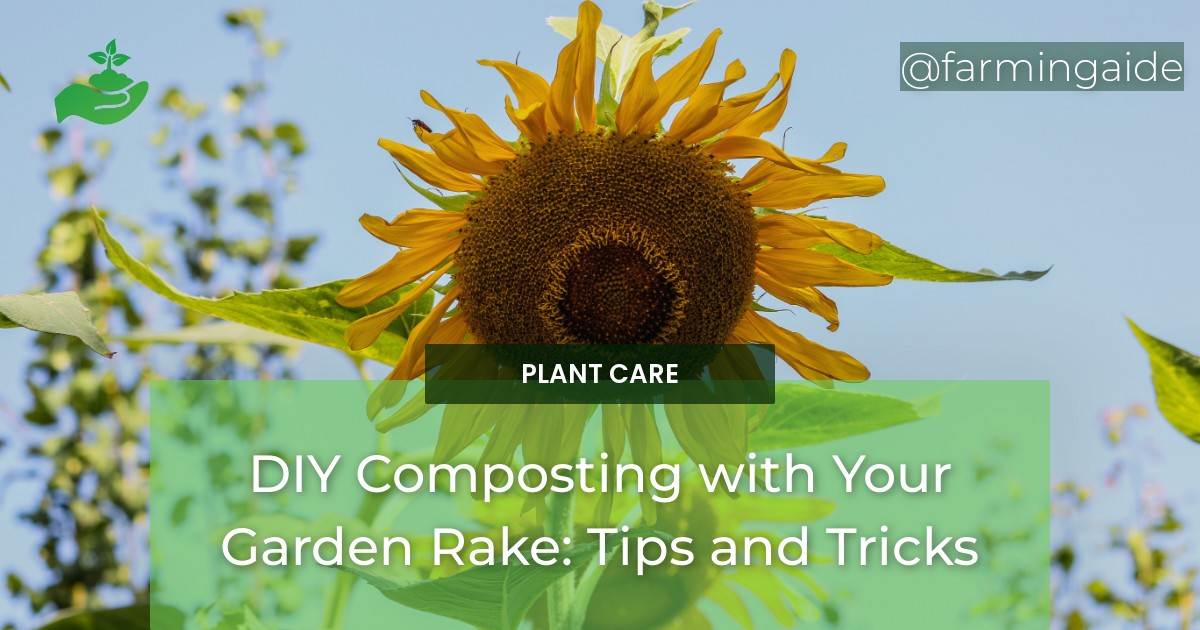DIY Composting with Your Garden Rake: Tips and Tricks
Composting has become increasingly popular in recent years, particularly in the urban farming and horticulture industry. This sustainable practice not only reduces household waste, but also provides nutrient-rich soil for plants to thrive in. While there are various tools and methods for composting, using a garden rake can be an effective and efficient way to turn and mix compost. In this article, we will explore the benefits of composting, the role of a garden rake in the process, and essential tips and tricks for DIY composting with a garden rake.
Understanding Composting and its Benefits
Composting is the process of breaking down organic materials, such as food scraps and yard waste, into nutrient-rich soil. This natural process mimics the way materials decompose in nature and creates a valuable resource for gardening and farming. The benefits of composting are numerous, including:
- Improving soil health by adding essential nutrients and microorganisms
- Enhancing plant growth and reducing the need for chemical fertilizers
- Reducing household waste and the amount of waste sent to landfills
Using a Garden Rake for Composting
A garden rake is a versatile tool that is commonly used for raking leaves and debris. However, it can also be a valuable tool in the composting process. Here’s why:
- A garden rake can easily turn and mix compost, ensuring proper aeration and decomposition.
- It can break down large materials in compost, making it easier for them to decompose.
- Using a garden rake can save time and effort compared to manually turning compost with a shovel or pitchfork.
When selecting a garden rake for composting, it is important to choose one with sturdy tines and a comfortable grip. Look for a rake with curved tines, as they are better for scooping and mixing compost. Additionally, consider the length and weight of the rake to ensure it is suitable for your needs.
Best Practices for Turning and Mixing Compost with a Garden Rake
Turning and mixing compost is crucial for efficient decomposition. Here’s how to do it effectively with a garden rake:
- Start by removing the top layer of compost, which may have already decomposed, and set it aside.
- Use the garden rake to turn and mix the remaining compost, breaking up any clumps and incorporating air into the pile.
- Add water as needed to maintain proper moisture levels, which should be similar to a damp sponge.
- Repeat this process every few weeks to ensure proper aeration and decomposition.
By regularly turning and mixing compost, you can speed up the decomposition process and create nutrient-rich soil for your garden.
Tips for Efficient and Effective Composting with a Garden Rake
In addition to proper turning and mixing techniques, there are other tips and tricks for successful composting with a garden rake:
- Maintain a balance of green and brown materials in your compost pile. Green materials, such as food scraps and grass clippings, provide nitrogen, while brown materials, such as leaves and twigs, provide carbon.
- Layering your compost pile can also help maintain this balance and promote efficient decomposition. Alternate layers of green and brown materials, with a layer of soil or finished compost in between.
- If you have large materials, like branches, in your compost pile, use a garden rake to break them down into smaller pieces. This will help them decompose faster and create a more uniform texture in your compost.
Common Mistakes to Avoid When Composting with a Garden Rake
While composting with a garden rake is a straightforward process, there are some common mistakes that can hinder the composting process. These include:
- Adding too much of one type of material, which can throw off the balance of nutrients in the compost pile.
- Not turning and mixing the compost frequently enough, leading to slow decomposition and potential odor issues.
- Not having enough moisture in the compost pile, which can slow down decomposition.
By being aware of these mistakes and using a garden rake to properly turn and mix your compost, you can avoid these issues and create nutrient-rich soil for your garden.
Alternative Uses of a Garden Rake in Composting
In addition to turning and mixing compost, there are other creative ways to use a garden rake in the composting process. These include:
- Creating a compost bin by using a garden rake to secure fencing or chicken wire around a designated area.
- Using a garden rake to turn compost piles that are too large to be turned with a pitchfork.
- Using a garden rake to mix different compost piles together for a more diverse and nutrient-rich final product.
Aside from composting, a garden rake can also be used for other gardening tasks, such as raking soil, spreading mulch, and leveling garden beds. To extend the lifespan of your garden rake, remember to clean and dry it after each use and store it in a dry place.
How Can Using a Garden Rake Help with DIY Composting?
Using a garden rake can greatly enhance the benefits of DIY composting. The rake helps in turning and aerating the compost, allowing oxygen to reach the microorganisms that break down the organic matter. This helps speed up the decomposition process and ensures a better-quality compost for your garden.
Conclusion
In conclusion, composting with a garden rake is a simple and effective way to turn household waste into nutrient-rich soil for your garden. By understanding the benefits of composting, using the right garden rake, and following best practices, you can create a successful compost pile for your gardening needs. Remember to avoid common mistakes and get creative with alternative uses of the garden rake in composting. With these tips and tricks, you can become a DIY composting pro in no time!


